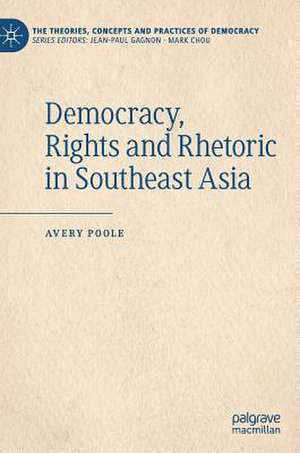Democracy, Rights and Rhetoric in Southeast Asia: The Theories, Concepts and Practices of Democracy
Autor Avery Pooleen Limba Engleză Hardback – 24 mai 2019
Preț: 381.81 lei
Nou
Puncte Express: 573
Preț estimativ în valută:
73.06€ • 76.47$ • 60.81£
73.06€ • 76.47$ • 60.81£
Carte tipărită la comandă
Livrare economică 31 martie-14 aprilie
Preluare comenzi: 021 569.72.76
Specificații
ISBN-13: 9783030155216
ISBN-10: 3030155218
Pagini: 72
Ilustrații: XI, 83 p. 1 illus.
Dimensiuni: 148 x 210 mm
Greutate: 0.27 kg
Ediția:1st ed. 2019
Editura: Springer International Publishing
Colecția Palgrave Pivot
Seria The Theories, Concepts and Practices of Democracy
Locul publicării:Cham, Switzerland
ISBN-10: 3030155218
Pagini: 72
Ilustrații: XI, 83 p. 1 illus.
Dimensiuni: 148 x 210 mm
Greutate: 0.27 kg
Ediția:1st ed. 2019
Editura: Springer International Publishing
Colecția Palgrave Pivot
Seria The Theories, Concepts and Practices of Democracy
Locul publicării:Cham, Switzerland
Cuprins
1 Conceptions of Democracy and Human Rights in Southeast Asia.- 2 Democracy in Rhetoric and Reality.- 3 Human Rights and Regional Institutions.- 4 Conclusions: Liberal Norms and the Role of Regional Organisations.
Notă biografică
Avery D.H. Poole is Senior Fellow at the Australia and New Zealand School of Government (ANZSOG) and Honorary Senior Lecturer at the Crawford School of Public Policy at the Australian National University. She was previously Assistant Director of the Melbourne School of Government at the University of Melbourne, Australia.
Textul de pe ultima copertă
‘Southeast Asia has become a more authoritarian place in the last decade, so why do regional elites continue to use the rhetoric of democracy and human rights? Why have non-democratic states even worked to establish human rights institutions? Avery Poole’s book is an insightful, accessible and illuminating account that answers these questions. It’s a timely and very valuable piece of scholarship.’
–David Capie, Victoria University of Wellington, New Zealand
‘This book is very interesting and does an excellent job of addressing its core concern: why has ASEAN evoked the rhetoric of democracy and human rights and what does this rhetoric mean in practice? The author has put forward a clear and defensible thesis: the ASEAN states have adopted this rhetoric because it legitimizes their organization in the eyes of the Western world’
–Shaun Narine, St Thomas University, Fredericton, Canada
Southeast Asia is a vast, populous and diverse region. The Association of Southeast Asian Nations (ASEAN) promotes democracy and human rights as central to regional order and cooperation, but most members are not democratic and have poor or questionable human rights records. This book explores why Southeast Asian countries have collectively adopted the rhetoric of democracy and human rights, and argues that they are motivated by their concerns about external regional legitimacy. It analyses ASEAN’s references to democracy and the reality of backsliding in several countries; examines the adoption of human rights rhetoric; and considers the implications for how we understand regional cooperation. The book is relevant for students and analysts who are interested in regionalism in Southeast Asia and elsewhere – particularly given growing global concerns about liberal democracy and the gaps between rhetoric and political realities.
Avery D.H. Poole is Senior Fellow at the Australia and New Zealand School ofGovernment (ANZSOG) and Honorary Senior Lecturer at the Crawford School of Public Policy at the Australian National University. She was previously Assistant Director of the Melbourne School of Government at the University of Melbourne, Australia.
–David Capie, Victoria University of Wellington, New Zealand
‘This book is very interesting and does an excellent job of addressing its core concern: why has ASEAN evoked the rhetoric of democracy and human rights and what does this rhetoric mean in practice? The author has put forward a clear and defensible thesis: the ASEAN states have adopted this rhetoric because it legitimizes their organization in the eyes of the Western world’
–Shaun Narine, St Thomas University, Fredericton, Canada
Southeast Asia is a vast, populous and diverse region. The Association of Southeast Asian Nations (ASEAN) promotes democracy and human rights as central to regional order and cooperation, but most members are not democratic and have poor or questionable human rights records. This book explores why Southeast Asian countries have collectively adopted the rhetoric of democracy and human rights, and argues that they are motivated by their concerns about external regional legitimacy. It analyses ASEAN’s references to democracy and the reality of backsliding in several countries; examines the adoption of human rights rhetoric; and considers the implications for how we understand regional cooperation. The book is relevant for students and analysts who are interested in regionalism in Southeast Asia and elsewhere – particularly given growing global concerns about liberal democracy and the gaps between rhetoric and political realities.
Avery D.H. Poole is Senior Fellow at the Australia and New Zealand School ofGovernment (ANZSOG) and Honorary Senior Lecturer at the Crawford School of Public Policy at the Australian National University. She was previously Assistant Director of the Melbourne School of Government at the University of Melbourne, Australia.
Caracteristici
Builds on renewed interest in ASEAN’s successes and roles following its 50th anniversary in 2017 and on topical issues such as human rights violations in Myanmar Discusses the involvement of regional organisations in the domestic governance of member states, using an underexplored case study Serves as a critical reminder that democratic and human rights rhetoric is quite different to political reality













